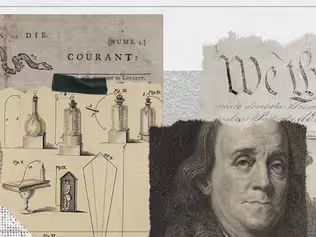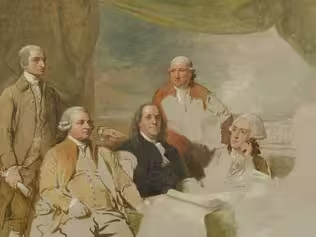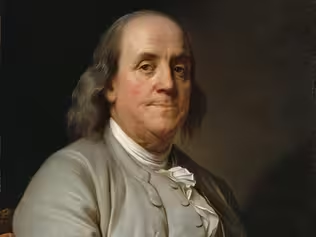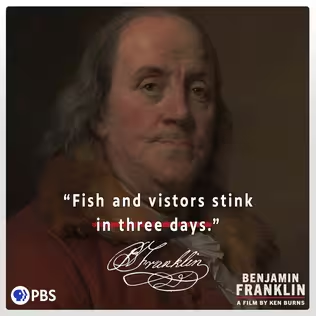
A Discussion with Mandy Patinkin and Michael Douglas
Special | 25m 27sVideo has Closed Captions
Ken Burns speaks with Mandy Patinkin and Michael Douglas.
Ken Burns speaks with Mandy Patinkin and Michael Douglas to discuss what it's like to take on their roles as founding father Benjamin Franklin.
Problems playing video? | Closed Captioning Feedback
Problems playing video? | Closed Captioning Feedback
Episodes presented in 4K UHD on supported devices. Corporate funding for BENJAMIN FRANKLIN was provided by Bank of America. Major funding was provided by David M. Rubenstein. Major funding was...

A Discussion with Mandy Patinkin and Michael Douglas
Special | 25m 27sVideo has Closed Captions
Ken Burns speaks with Mandy Patinkin and Michael Douglas to discuss what it's like to take on their roles as founding father Benjamin Franklin.
Problems playing video? | Closed Captioning Feedback
How to Watch Benjamin Franklin
Benjamin Franklin is available to stream on pbs.org and the free PBS App, available on iPhone, Apple TV, Android TV, Android smartphones, Amazon Fire TV, Amazon Fire Tablet, Roku, Samsung Smart TV, and Vizio.
Buy Now
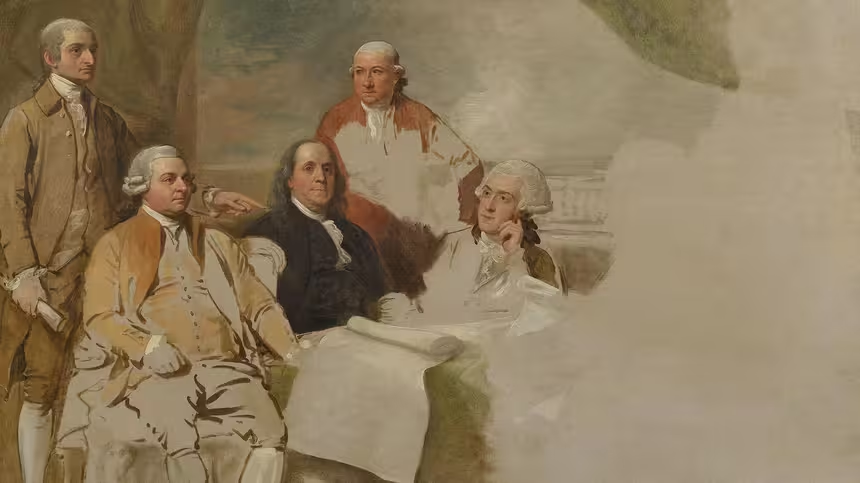
Conversations on Franklin
Join hour-long discussions with Ken Burns and special guests, featuring clips from the two-part series.Providing Support for PBS.org
Learn Moreabout PBS online sponsorship- Hi, I'm Ken Burns.
We're in for a very, very special treat.
We're going to have a conversation about being Franklin.
That is to say being Benjamin Franklin with two extraordinary actors and human beings, Mandy Patinkin and Michael Douglas.
Let me just start off by thanking Michael Douglas so much for joining us today.
We're thrilled to hear that you will be portraying Benjamin Franklin in an upcoming Apple TV Plus limited series.
And we know you're still in production, but thought it would be fun to have you and Mandy, who provides Franklin's voice in our recent documentary, "Benjamin Franklin" that's airing on PBS starting April 4th and 5th and streaming on all related platforms to PBS to share thought on what it's like to be Franklin or approach Franklin and that sort of thing.
So let's get started.
Let me start off with Mandy who now has Benjamin Franklin, if not in his rear view mirror, then something that's now under his belt and tell us, Mandy, what's it like to be Ben Franklin?
- Well, it was a surprise to be him.
I had read Walter Isaacson's book a number of years before you were kind enough to call me and was surprised at how much I missed when I watched your four-hour documentary, which I just have to say for those, you know, I'm just saying it, period, not everybody's seen at least one of your many prolific journeys through history, but how you take absolutely nothing, out of nothing you make a whole film, four hours long, that take us on a history lesson that is extraordinary.
There certainly is his biography and his writings and many other people's writings, but it is an extraordinary education.
When my wife and I watched it, we couldn't get over what we didn't know or what we thought we knew that we didn't.
First of all, just the language itself, Michael, I thought was fascinating, 'cause I'm guided by all these historians who, it's pandemic, I'm in my little room with the Zoom screen as we all live by and the language that Ben Franklin sometimes spoke in was an older English than I'm familiar with, and first of all, they literally interpreted it for me initially like I sometimes have people do with Shakespeare because that's almost a foreign language to me at times.
So that was enlightening.
And then just trying to find ways to connect as we walk through his words.
Where is he that I am, wanna be, was, Where is he that I am, wanna be, was, or hoped to be in my journey.
And the little corners start to reveal themselves.
Especially, and I think of you Michael, with this most of all, my relationship with my two sons and your relationship with your family as father and son.
And that to me was the core ballgame of the fulcrum that this man lived around.
- You know, Michael, Mandy had a wonderful way of working with us, it was by Zoom, but it would've been the same if we were right with him in that as he got at the heart of what each of the first-person quotes was like, he got to an emotional core about it, and then he would speak to himself.
"Oh, yes, I feel gratitude, thank you, thank you so much."
And then he'd move into a sentence and he'd get halfway through it, wouldn't be satisfied, would start again.
I'm curious as you're approaching this, how you're figuring out, how you're dissecting, how you're understanding Franklin?
What's your approach to him?
- Well, thank you, Ken, and let me preface all this by supporting what Mandy said about your documentary, which was just spectacular on Franklin, and Mandy, thank you as I've been looking for Franklin's voice and his rhythm, you did an extraordinary job and your voice was spectacular.
I took a long time, I was overwhelmed by the guy.
He just makes us all feel like, (chuckling) like we just haven't accomplished anything in our lives.
And so it really was trying to find a hard way to kind of get in there because he seemed to be everything to everybody.
And then gradually, and I felt it from Mandy's interpretation, he has a wonderful, unique style of writing and prose, the way he speaks and the way he writes, where he sort of presents both sides of an argument in his sentences, his long, elaborate sentences.
And so for me, he always used to be sort of analyzing the situations from both sides, the good and the bad, and then that combined with this really truthfully pure Protestant ethic and the understanding and belief that he really did begin and create the middle class in his treatments of how he treated people and how he saw things.
It began to make more sense.
And then again, the ying and the yang, he had a rasty side to him, he had a little naughty side to him.
He loved life and enjoyed life.
So it's been a kind of a steady process.
The only two areas where I saw this unbelievable kind of vehemence was after separating from England, after being humiliated when he spoke in the pit before England, and basically did not look back, and with his son, William.
- William, yeah.
- Where also there were chances to reconnect later in life and he refused to, again, based on the idea that William stayed a Loyalist and he didn't.
So I'm still got a ways off and working my way through, but it's been a joy and a treat to see your show.
And I think it's gonna help me a lot with our Apple TV Plus limited series that we're doing.
- Well, it's so interesting that you say that.
He does put us all to shame.
And if you just begin to think about it, he's the best American writer of the 18th century.
He's a successful businessman, a printer, a publisher, an Almanac purveyor, he's a postmaster.
He retires at a relatively early age to devote himself to science.
He's an inventor, he conquers the world of electricity, all the terms that we use today, positive, negative, charge, battery, conductor are Franklin's terms.
He's the Isaac Newton of the 18th century.
If there were Nobel prizes, he would have it.
And he holds all of his inventions without a patent.
So those of you who just look to Benjamin Franklin as the example, the epitome of pulling yourself up by your bootstraps, the American dream, on the hundred dollar bill, you've missed one half of the equation.
It's almost as if you've torn the bill in half and you have half of it, the other one as Walter Isaacson says in the film, "The things we do together far surpass the things we do alone."
That he always knew to bind that back to a kind of civic engagement.
And I think both of you have that ability to marry and connect these disparate parts.
You called it the ying and yang, Michael, I agree.
And Mandy, I would just ask you just about how you saw that as you were reading it?
I found being in your presence such an amazing tutorial in the emotional archeology as I like to call it, of what these things mean and feel.
- Well, I, (exhaling) God, I would start to say these words, these paragraphs and Michael, I was not, (chuckling) I envy you, Michael, I've never been jealous of another actor, but that you get to play this guy, I really envy you.
And I don't think any actor should embark on any project without having Ken first do a documentary on the landscape, because what a gift you've given every actor that even considers anything that you've touched.
When I would just read the words over and over again, they would start to bring up things in my mind and my head about when you talk about William, about struggles I might have had with one of my two boys in terms of just all that stuff.
Michael, I don't have to tell you, who comes from such a famous father.
And when you have a father that people know and what's that like for a kid?
And what mistakes have you made as a parent?
And how do you take care of your son?
And then things that would just throw me as we're moving along, that Deborah, he just walks away from her, essentially.
This woman who he supposedly loves, he goes away for years and doesn't come back.
I just started to realize how complex this man was, how complicated he was.
And the fact that the common knowledge things that he starts off a slave owner and ends up an abolitionist.
That ability to change and -- - Grow.
- Grow and his ability to listen.
And I think the thing that struck me the most, given the moment we're living in, and I'm always trying to find out, the world is so broken right now, what story are we telling, why are we telling it, and what good can it do for the world as a whole, given the fact that we can reach so many?
And for me, I think the nervous system of it is not only his ability to listen, but A, his humor, always his humor in the midst of living, but his ability to compromise and realize that he would've lost the Republic had he not accepted, I think it was the three colonies that would not give up slavery.
And he knew that if he didn't say okay to that for the time being, he'd lose the whole ball game.
And that coupled with losing his son, those kind of compromises, I just found extraordinary.
- Yeah, it's amazing.
He used to say, he started up essentially a workers' group, young tradesmen getting together, talking.
They weren't elitist, they were leather apron guys, and they were learning their trades, but they wanted to talk about bigger ideas.
He starts a library, he ends up starting a college, all of this stuff, but it all goes back to the word for it, "junto" which was a connection.
And he saw this almost the way a carpenter would make a joint of wood.
You shave a little bit off here, Walter Isaacson says, A little bit off here and it makes a bond.
It makes a joint that will last for centuries.
And the further thing is, is great compromises don't make great heroes, but they make great democracies.
And I think right now we're all independent, free agents.
Too much pluribus not enough unum.
And it seems to me, that's Arthur Schlesinger Junior, the late historian said that, which I love, we all should be about unum.
This is what Mandy's talking about, and I'm wondering Michael, as you're at the early stages of this, how you're getting to that?
How you're getting to that ability to see, to listen, to reconcile the seemingly irreconcilable differences that seem to be threatening to dash our republic at this moment against the rocks?
- Well, with all of the things that he accomplished, Ken, I don't think it's too far to say that if it wasn't for him going over to France and getting the French support, we would not have the United States.
We would have never succeeded.
So in seeing this story again, I have a new respect for the French, and I think it's very crucial that we all realize just what an instrumental important part they played in the beginning of our career.
To pick up on what Mandy was saying, he was very cold and cruel as far as intimacy was concerned, both in how he treated his wife, Deborah, in terms of the absence, I think only one letter when he went away in the early times and with William.
So there was as we talk to this balance, there was a mean streak, I think in him, as well as a sense of good humor and charm.
And he did seem to have a pretty healthy ego in knowing that he had that ability of charm with the ladies as well as with the politicians and diplomats and everybody, he was at ease, and it's hard to reconcile that with a man that was so cold to those people that were the closest to him.
So I'm still working through this quite honestly, this dichotomy and beginning to see a man who appeared to be one thing in public, and somebody very different in private.
There was a healthy degree of vanity, I think, that went along with his intellect and his charm.
And unfortunately, he's a great spokesperson for being self-educated and not going to school.
That was the other thing, because everything seemed to reside in the fact that this man was consumed with books.
And the amount of knowledge that he attained earlier in his life, just by this voracious reading ability and at the same time, sort of analyzing writing ability so that he had this unbelievable writing style and technique throughout his life.
- You know, I was going to bring that up, but you brought it up and that's exactly right, I think one of the keys to understanding him is that limited education.
He has two years of formal schooling.
His parents, lower middle class, candle makers, they want him on a Harvard elementary school, high school track, and they can't afford it after two years.
So as H. W. Brands, the writer, says in our film, "He didn't know what he didn't have to know."
School teaches you stuff to know, but it also imparts to you the stuff that you don't have to know, and Franklin didn't know the things that he didn't have to know, so he figured he had to know everything.
And I can't parse, and maybe Mandy can, I can't parse that, I'm not sure it's coldness, Michael, maybe it is coldness, but that inner inability to live out some of the thing that he lives out in public, like he's supporting young women in their interest in education but he's disinterested in his daughter Sally's advancement out of the station that he's in.
He's away from Deborah 15 of the last 17 years of his life.
He knows she's sick, she's had a stroke, and he's not there when she dies and not there.
And then William who, look, let's face it, becomes a terrorist, killing Patriots after he's deposed as Royal Governor of New Jersey and spends some time in a prison and is exchanged.
But Franklin can't even after he's negotiated the most lopsided treaty, the Treaty of Paris.
First with the French, with suavity as Clay Jenkinson said, and then with just iron nails with the Brits to get the best terms ever, leaving out not only the British but the French, their friends, he then can't reconcile with William, something stubborn streak.
I don't know Mandy, whether you'd come to any terms with that or any kind of understanding, because it just goes in the face of the 12, the 13 virtues that he's practicing and the moral compass inside him.
- I think he's a player.
And I think he's a player to the nth degree where he, I want you to put in your film, Michael, please.
I mean, no offense to, it couldn't get in Ken's thing, but you know what I love about all these historians, it's like when you start to get to know him, Ken, and his team and Duncan and the experts in the film, and then I started rereading Walter Isaacson's book 'cause I couldn't get over what I missed the first round.
And then Walter's constantly nodding his head, and I think he even does it in your film, Ken, to David McCullough and John Adams' book.
Well, what these two guys had going with each other, and there's a scene that I hit on and I'm in the middle of John Adams' thing and I didn't see the televised version, but I wanna see you in bed with John Adams, that scene where they shared a bed together in this little place -- - And who's gonna open the window and who's gonna keep it closed?
- Oh my God, it was hilarious.
And it was so serious.
And then Adams is prickling at him.
And then when you start to read the various historians' biographies and the way these guys brilliantly drink in the information and dole it out, you start to feel that they have a loyalty to their subject in terms of who rewrote what, and I just think it's no different than anything you know today.
You work on things to try to raise money for a great cause to help people have a place for cancer.
And the next thing you know, the person who gave the money for the building is bitching because their name wasn't on the plaque and they didn't get the credit.
All of this stuff -- - So history's a conversation, Mandy, nothing's definitive.
And I wonder what kind of thumb to carry on what Mandy has just said, Michael, what kind of thumb on the scale your series will have with regards to Franklin?
Because I think one of the foils in our film is that John Adams, who's in a magnificent character and Joe Ellis gives him his due.
They're a good cop and bad cop, but Adams is just totally freaked out by Franklin who's not living up to his aphorisms.
Where is early to bed, where is poor Richard?
And he's perturbed that he's already secured two deals with the French and he's got nothing.
So, do you have a sense, or can you share with us where you think you guys are gonna come down, with your Apple TV Plus series?
- The interesting aspects for a documentary versus trying to create a dramatic spy thriller, for lack of a better word, which I think is a large part of what we accomplishing with Franklin going over there is that he initially doesn't ask for anything.
I mean, he's there, he's a rock star.
France is so happy to have him there and dramatically, we make it dramatically, we worked it out, he takes a very easy position in terms of reaching out to the French authorities and everybody else to get their support.
He doesn't come with an open hand looking for help right off the bat.
So it really, it's an interesting, and then succeeds when Washington has some success and finally gets through, and John Adams arrives in France, right when he's completed the deals.
(Ken laughing) But then, it a great, Mandy was saying that the conflict, the petty jealousy of Adams and coming to France and feeling just belittled by this adoration that Franklin is getting, continually getting, plays very well for the second part of our series.
- I've buried the lede that your series is based on part on Stacy Schiff's wonderful book about Franklin in Paris and Franklin the diplomat, and the way in which he was able to win over the French public, win over the French intellectual set, win over the salon, win over the foreign minister, Vergennes, and win over even Louis the 16th.
Asking one monarch to depose another, or get rid of another, which is going to give the French people ideas, which they certainly got.
- They surely did, yeah.
- It's a marvelous thing.
And he's surrounded by spies, his owns secretary is a spy.
So we have Stacy's wonderful book and she's a huge part of our documentary and I'm glad that you're focusing intensely on that aspect of it.
- And also, I'm thinking Michael, that the French with their acceptance of mistresses, that's very common in France.
People don't wrinkle their eyebrows or anything about it.
And I think when your comment about his puritanical nature, that this was a great relief.
I'm not sure Franklin was guilty about anything that he did in terms of the ladies, but I'm quite certain, he was most comfortable with the freedom that he felt in France to be himself with the ladies, whether he was a great papa to the beautiful younger ladies or having a chess lesson while Madame Bovary was in the bathtub or whatever it is.
But I tell you, I look forward to that part.
I don't care what you do about the spy aspect, but your charm alone in that ballpark is gonna be great.
(Ken laughing) Great, great.
- He had a lot of fun.
Yeah, he enjoyed the raconteur, he's a wonderful raconteur.
And I think preferred to listen to the ladies.
But Madame Brillon, I think he was pretty clear about that when he would like to have moved things along a little further and she explained to him that she was married and all that.
And then he moved on, he did move on.
- Catherine and I, my wife, Catherine and I walking down the street the other day, a very notable person who I will not mention who it was, he didn't have a mask on, he was sort of leaning against a wall and he had like a little butt of a cigar and he was cleaning it and I looked and I said, "I think that's so and so" and I said, "Hey" and he said, "oh yeah, hi, how are ya'?"
And then we mentioned his partner who we'd known he'd been with for some time, first, he was like, don't tell that I'm smoking the cigar.
"Oh, no problem, no problem."
And then we mentioned the partner that we knew he was with, "Oh, no, we broke up," he said, "we broke up."
And then right away, he said, "But life is good, life is good," he said, "life is good."
And then within three minutes, this gorgeous young lady comes with a bright pink, long coat and he just looked at us, and said, "Life is good, life is good."
And we knew this young lady, but he was like, "Life is good, life is good."
He was the essence of Ben Franklin in Paris or meeting anybody's criticism or raised eyebrows.
- Well, gentlemen, unbelievably we have come to the end of what seems like a too-short time.
I'm so grateful, I hope that everybody has a chance to watch Mandy Patinkin off-camera read the words of Benjamin Franklin in our documentary called, "Benjamin Franklin" on April 4th and 5th on PBS and streaming everywhere after that.
And that we so, Michael, look forward to your series, your upcoming limited series on Apple TV Plus, and we're grateful to both you extraordinarily-talented gentlemen for giving us a little bit of time and bookending us this year, or perhaps next with two, what I'm sure will be extraordinary performances of Benjamin Franklin.
I thank you from the bottom of my heart.
- Well, thank you, Ken.
Ken, you made me a Ben Franklin addict and Michael, I'll be the first one to say I cannot wait to see what your team and you do with it all.
- Thank you, Mandy, you're always, always a pleasure.
Big fan of yours, and Ken you're a national monument.
Continue all your good work, I really appreciate it.
- Thank you, Michael, good luck with everything.
Everybody stay safe and well.
- Okay, thank you.
- Bye-bye, thank you.
Support for PBS provided by:
Episodes presented in 4K UHD on supported devices. Corporate funding for BENJAMIN FRANKLIN was provided by Bank of America. Major funding was provided by David M. Rubenstein. Major funding was...

